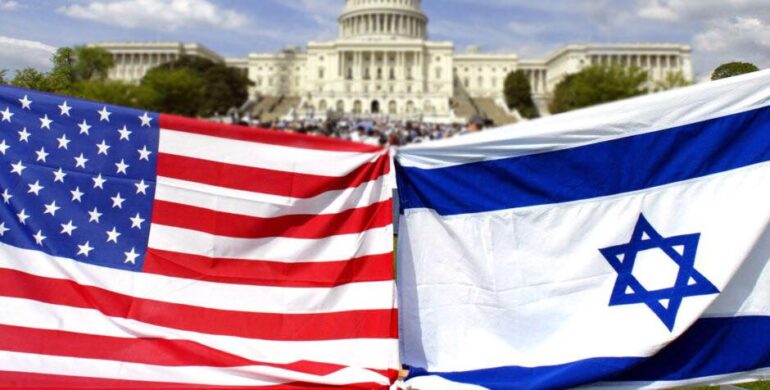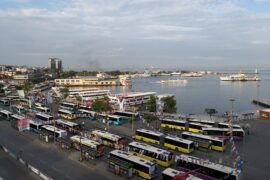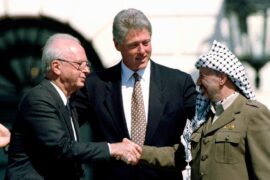Israel and Edom are in conflict. The spiritual battle that assured our victory so many years ago when Yaakov defeated Esav’s angelic force rages on in our physical plane, as it has for millennia since the rise of Edom. While the power center of Edom has shifted, from Rome to Paris to London and now to Washington, the core conflict remains.
Edom seeks to assimilate the world into its own form – the spread of a hollow consumerist culture through global capitalism, the promotion of liberal pseudo-democracy throughout the world, and the expansion of America’s military-industrial networks all serve as evidence of Washington’s Edomite nature.
Yet far too many Jews, today and in the past, have failed to recognize our ongoing struggle. Along with the many parts of our culture that have been colonized over millennia of exile from our land, many Jews have lost touch with the uniquely Hebrew approach to historiography, which centers primordial spiritual forces rather than material conditions or ideological positions in its understanding of the passage of time.
As Jews were forced or pressured to abandon our ancient way of life, many came to see themselves as parts of Western historiographic processes of “civilization” and “progress.” In such an understanding, the “progression” of Western civilization from naked Roman imperialism to Roman Christianity to Christian Europe to liberal Europe appears to be the triumph of Jewish values over others in a universalizing civilizational spread – “progress.”
Among the early Zionist thinkers, Theodore Herzl is one of the starkest examples of this paradigm. His upbringing in Austrian society, and his early admiration for German culture as a way to “civilize” Jews, can still be found in his later Zionist writings. His belief in a Jewish national home was often framed as an answer to the European “Jewish Question” rather than a realization of a 2,000 year dream to restore the Jewish independence stolen from us by the Roman Empire, the forces of Edom, which the Austrian Habsburg monarchy saw as its historic and spiritual predecessor.
Herzl’s internal colonization explains his willingness to accept a home in Uganda rather than Eretz Yisrael – an issue that greatly diminished his prestige in the Zionist community at the end of his life. His internal colonization also influenced his views of the Jews and Arabs of Palestine. After his first trip to Jerusalem, he wrote of his intentions to demolish large swaths of the old city, which he saw as backwards and dirty, in order to develop modern European real estate.
This preference for “progress” over the recognition and celebration of the city’s native culture and historic kedusha demonstrates Herzl’s twisted understanding of the eternal importance of Eretz Yisrael to Jews. While he is considered the father of Zionism by historians, and his contributions to the development of Jewish national consciousness were invaluable, the Jewish masses that opposed his Uganda Plan and his intentions for Jerusalem demonstrate the strength of our deep connection, as a people, to our land and its history.
David Ben-Gurion, first prime minister of the State of Israel and the leader of many pre-state Jewish institutions, similarly internalized the values of Edom, though his relationship with Edom was more political than cultural. Throughout the final years of Britain’s occupation of our land, Ben-Gurion worked closely with the regime in hopes of gaining favorable treatment from our homeland’s foreign rulers. He repeatedly attempted to appease the British, even as they increasingly blocked Jews from returning to Palestine from the fires of Europe. He and his Hagana forces also hunted Jewish freedom fighters and handed them over to the authorities. Out of a misplaced faith that defending the British – his generation’s strongest incarnation of Edom – could serve Jewish interests, Ben-Gurion undermined the true fight to liberate our national home.
Even when the united “struggle” against British occupation gained steam after World War II, Ben-Gurion’s Hagana was careful to focus its attacks on infrastructure related to stopping Jewish immigration, avoiding more serious operations targeting the empire’s economic and military interests in the region, as well as political actions that would challenge the very legitimacy of the British Mandate.
Even after the Jewish underground forced the British to end its rule over Palestine, Ben-Gurion’s track record didn’t improve. He accepted the 1947 United Nations partition plan, relinquishing the cradle of Jewish civilization and allowing for the internationalization of Jerusalem.
Even to this date, the internally colonized decisions of the 1947 Jewish leadership plagues both the Jews and Palestinians of Judea, Samaria and Jerusalem, who live in constant states of flux between Israeli, Palestinian and international laws. Instead of applying sovereignty to the territories as the essential parts of our homeland that they are, we surround them with a wall, fill them with military checkpoints, and prevent all people from traveling freely through them, in order to not anger Edom’s new faces in Washington.
Today, organizations branding themselves as the greatest defenders of Israel and its interest regularly celebrate Israel as an outpost of Western civilization in the Middle East. When StandWithUs, AIPAC, and most recently Ben Shapiro, celebrate the values of Western civilization, they attempt to tie Israel to America and Europe, separating us from our Semitic neighbors (who are explicitly or implicitly understood to be backwards and uncivilized in this classically orientalist paradigm).
But what are these values of Western civilization? The Western ideal, inherited from Rome, Christianity, and Enlightened Europe is the proliferation of individual liberties in exchange for communal assimilation.
Just as Roman citizenship guaranteed the rights of personal security and safe travel at the cost of submission to Roman imperial culture and later Roman Christianity, the cost of inclusion in Enlightened Europe’s “liberal” society was always a cultural assimilation – an identification with the state above all, at the expense of more particular communal affiliations. So when Jews yell proudly that Israel is the most liberal, most Western, and most enlightened country in the Middle East, is this the ideal to which we’re laying claim?
Are we proud of the continued insistence that Israel is a state for all people, but only as individuals? That Palestinians living here can only live here as Israelis and abandon any national identification with the Palestinian people? Are we proud of the decades spent suppressing Moroccan, Yemenite, even Russian Jewish cultures in an attempt to create one, tzabar-like Israeli Jew, free as an individual so long as he erases every non-tzabar aspect of his identity? Is this the ideal that a deeply Jewish state aspires to?
We must shift away from our affiliation with Edom and it’s conformist tendencies, and embrace our own uniquely Hebrew universalism that can appreciate the differences inherent between peoples and cultures rather than attempting to ignore or erase them. This is the crux of our ongoing conflict with Edom, which climbs towards a fever pitch every day, and which we are destined to win – we must only embrace our role in the struggle and realize the uniquely Hebrew worldview that will present the keys to victory.





